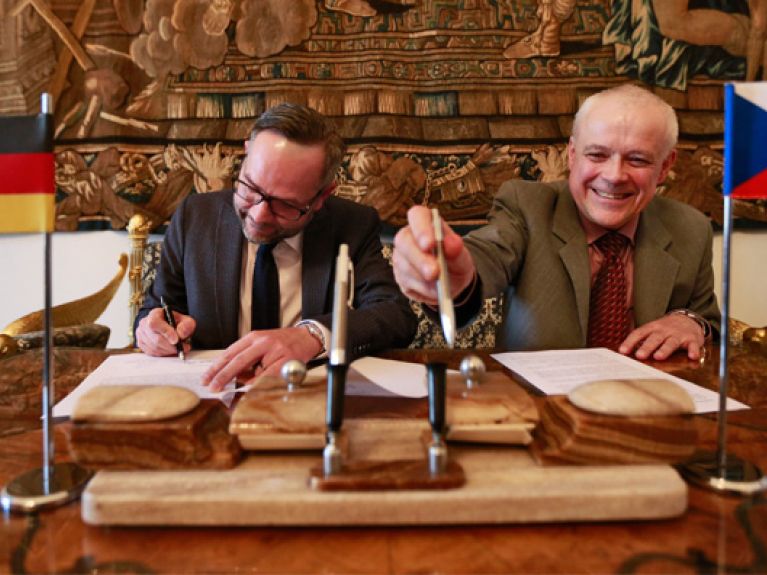Principle of solidarity
Germany and the Czech Republic are continuing discussions on the subject of refugees. During the Dialogue on Migration in Prague they agreed on a joint commitment in Jordan.

There is probably no better place to talk about refugees and migration than the German Embassy in Prague. In late summer 1989 thousands of GDR refugees occupied the grounds and demanded to be allowed to emigrate to the Federal Republic. On 30 September, Hans-Dietrich Genscher, the Federal Foreign Minister of that time, appeared on the Embassy balcony and spoke the words of freedom that were drowned out by cries of jubilation. This place became a symbol for the joy of liberty.
Today people are again seeking protection – in Germany, in the Czech Republic and in other countries of Europe. Among European partners there are different opinions on how to deal with the large number of refugees. Germany and the Czech Republic did not always share the same view when an especially large number of people arrived in 2015. In order to maintain communication, the two countries launched the German-Czech Dialogue on Migration. “We need common solutions for common challenges,” said Michael Roth, Minister of State for Europe of the Federal Foreign Office, during discussions with representatives of Czech civil society at the German Embassy in Prague on 28 November 2016.
Joint effort in Jordan
The discussions kicked off what is now the third meeting within the framework of the Dialogue on Migration. Representatives of both governments agreed concrete steps of cooperation during their meeting at the Czech Foreign Ministry later. They wish to make a joint commitment to a refugee project in Jordan. In general, the partners agreed that Europe must direct its attention more strongly to the refugees’ countries of origin and to the transit states.
This principle is also part of the joint declaration that Michael Roth and the Director of the Department of Advisors to the Prime Minister of the Czech Republic, Vladimír Špidla, signed in Prague. The declaration states the basis for all efforts in dealing with refugees is solidarity, humanity and shared responsibility. It was also agreed that experts from ministries in both countries should consult more closely on individual issues – for example, on the integration of immigrants into the labour market.
The German visitors discovered what the Czech Republic is already undertaking in the field of integration during a visit to the premises of the non-governmental organisation Slovo 21. Its director, Jelena Silajdzič, herself came to the Czech Republic from Sarajevo 25 years ago. She explained that then no information was available at all to make a fresh start easier. Today things are different – thanks also to Slovo 21. Working on behalf of the government, the organisation supports migrants with integration and language courses. In addition, it has brought hundreds of Czech families together with immigrant families through a sponsorship project. According to Silajdzič, the team receives little support from voluntary refugee helpers; a culture of voluntary work is only slowly beginning to develop in the Czech Republic.
“Overcoming stereotypes and half-truths”
The civil society representatives had already made clear earlier that morning in the Embassy that it was not easy to promote the value of diversity among the population. They expressed their concern about media reporting in the country, which stirs up distrust especially against Moslem immigrants. A recent survey found that almost two thirds of the Czech population reject the acceptance of war refugees. That is why the participants at the meeting wanted to know from the visitors from Germany how they treat opponents of immigration in their country and how a fair distribution of asylum-seekers between different cities and regions is achieved in Germany.
This form of dialogue is to continue – in fact, as early as spring 2017 in Berlin. “Migration remains not only one of the most important subjects, but also at the same time one of the most sensitive and most controversial,” said Michael Roth. “We want to continue a fact-oriented dialogue in future to help overcome stereotypes and half-truths in the whole EU.”

